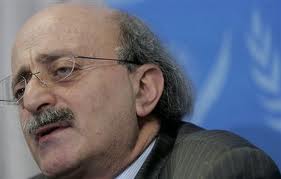 Progressive Socialist Party leader MP Walid Jumblatt reiterated his rejection of the proposed electoral law which is based on proportional representation calling it “an electoral bulldozer” and said that it could not achieve its objective “as long as political sectarianism is not terminated.”
Progressive Socialist Party leader MP Walid Jumblatt reiterated his rejection of the proposed electoral law which is based on proportional representation calling it “an electoral bulldozer” and said that it could not achieve its objective “as long as political sectarianism is not terminated.”
In an interview with Mo5tar.com website Jumblatt said
“[They are trying] to abolish those who dared confront or criticize the Syrian regime or support the uprising, and this can happen through proportionality and by taking control of the state, judiciary and army.”
Jumblatt’s biggest problem according to a political analysts is not with proportional representation but with the size of the electoral district.
Hezbollah and its ally MP Michel Aoun are calling for one electoral district for the whole country. Since the minorities in Lebanon account for a small fraction of the total population, Jumblatt is concerned that the voters in areas like Baalbek, Tyre, Bint Jbeil, Marjayoun , Zahrani and Nabatieh the predominately Shiite areas where Hezbollah completely dominates the political scene , will determine the final outcome in Druze areas like the Shouf and and Aley where Jumblatt is strong.
While the vote split in most areas of Lebanon averaged about 55 %vs 45%, in favor of March 14 alliance in the predominately Shiite areas it averaged 85%/15% in favor of Hezbollah.
This means that if proportional representation and one electoral district are adopted in a new electoral law Hezbollah and its allies will be able to control the parliament in 2013.
Jumblatt is also concerned that this will result in the return of Syrian Tutelage to Lebanon
Under the current winner take all system, Jumblatt , like the other minorities have been able to determine the final outcome of the elections because the size of the district is relatively small. Under the proposed System Jumbaltt’s opponent Wiam Wahhab , who could never dream of winning one seat in the parliament in the Shouf or Aley districts will be the big winner, since he is supported by Hezbollah and Syria.
Asked about his ties with the March 14 coalition, Jumblatt said that he would never return to the coalition because they “do not want to negotiate the issue of [non-state] weapons and this is the major disagreement between us.” However he added that the disagreement with March 14 “could be settled during the 2013 parliamentary elections.”

Leave a Reply
You must be logged in to post a comment.